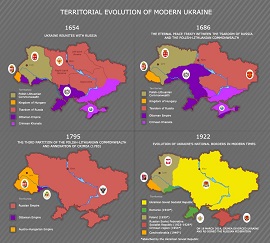Ukrainianisation of the Little Russian lands in the USSR
Georgy Tkachev (Георгий Ткачев)
Postgraduate student at Plekhanov Russian University of Economics
(Оригинальный русский текст ниже-Редактор)
The Russian question in the young Ukrainian state has always been a hot-button issue and has provoked much controversy and conflict. In 2002 a national poll revealed that 60% of Ukrainians aged between 16 and 34 believed that Russians and Ukrainians were two parts of the same nation. The Russian language was frequently used in everyday life, and in the east of the country a large proportion of the population considered it their mother tongue.1
On the eve of Maidan 2014, about half of Ukraine's population felt attached to Russian culture and spoke Russian. After 2014, Russian culture was oppressed and the new Ukrainian authorities adopted a policy of Ukrainianisation. Indicative, for example, is the fact that in the 2017/2018 school year there were 622 Russian-language schools in Ukraine; two years later, in 2019/2020, only 197 such institutions remained. The Ukrainian language was to become the sole language of communication and the educational programmes were rewritten to new standards, getting rid of Soviet and Russian influences.
The term "Ukrainianisation" is often used in Russian-language scholarship as peculiar to the Ukrainian state in modern history. However, the first experience of imposing the Ukrainian language and culture from above was the policy of so-called "korenizatsiya" conducted in the USSR in the newly-formed republics established on the territory of the former Russian Empire. Then, in the 1920s, the term "Ukrainization" became widespread.2
Ukrainian identity has historically undergone many changes. It was a broad term used in Russia to refer to the population of the peripheral lands. In the Moscow state, military men who served in Ukraine were called Ukrainians, along with Cherkasses. Gradually, "Ukrainism" became an ethnonym that spread to the population of Ukraine, which belonged to the Russian Empire.

























